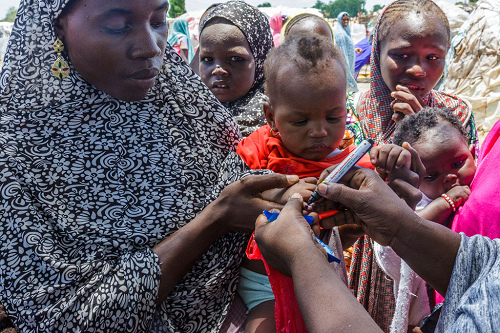Massive immunization campaign to reach 41 million children in Nigeria and region to contain polio outbreak
Vaccination drive provides platform for malnutrition screening in response to mounting crisis in Borno state
A major health campaign is underway in the Lake Chad Basin area to vaccinate over 41 million children against polio to contain the recent outbreak of the disease in north-east Nigeria.

UNICEF health worker uses a pen to mark the thumb of Ajeda Mallam, 6 months, who has just been vaccinated against polio at a camp for internally displaced persons outside Maiduguri northeast Nigeria.
Populations fleeing conflict are on the move within the sub-region, raising concerns that the virus could spread across borders. Nearly 39,000 health workers are deployed across Nigeria and neighbouring Chad, Niger, Cameroon and the Central African Republic to deliver the oral polio vaccine in areas at high-risk for the virus during five rounds of coordinated vaccination campaigns across five countries. UNICEF is procuring the vaccines and engaging the public through mass media and grassroots mobilization.
“The re-emergence of polio after two years with no recorded cases is a huge concern in an area that’s already in crisis,” said Manuel Fontaine, UNICEF Regional Director for West and Central Africa. “The scale of our response reflects the urgency: we must not allow polio to spread.”
The ongoing conflict has now displaced 2.6 million people, devastated provision of healthcare and left more than 4 million people in north-east Nigeria facing emergency food security levels. In the three worst-hit Nigerian states, 400,000 children are at risk of death from severe acute malnutrition.
Polio vaccination teams in parts of Borno state are conducting simultaneous malnutrition screening to identify cases of severe acute malnutrition in children under five and refer malnourished children to treatment programmes. Findings from the first rounds of outreach screening have confirmed high rates of severe acute malnutrition.
“Children are dying and more young lives will be lost unless we scale up our response,” said Fontaine. “Through the polio vaccination drive, we can protect more children from the virus while also reaching children in need with treatment for malnutrition.”
The third round of the current polio campaign runs from 15-18 October with additional rounds scheduled in November and December. The immunization campaign is being delivered by national Governments, with support from UNICEF, the World Health Organization, Rotary International, the US Centers for Disease Control and Prevention, and the Bill & Melinda Gates Foundation.
The coordinated efforts between the polio vaccination campaigns and childhood nutrition screenings are part of UNICEF’s scaled-up response to the crisis. However, UNICEF’s response remains hampered by continued insecurity, especially in areas of Borno state in Nigeria, and by a lack of funding. Of the US$158m needed for the emergency response in the region, only US$50.4m has so far been received.
Source: United Nations Children's Fund
- 296 reads
Human Rights
Ringing FOWPAL’s Peace Bell for the World:Nobel Peace Prize Laureates’ Visions and Actions

Protecting the World’s Cultural Diversity for a Sustainable Future

The Peace Bell Resonates at the 27th Eurasian Economic Summit

Declaration of World Day of the Power of Hope Endorsed by People in 158 Nations

Puppet Show I International Friendship Day 2020

